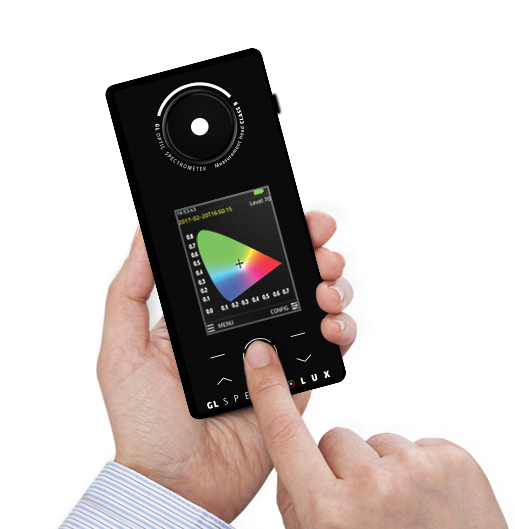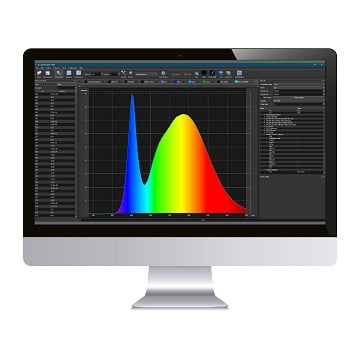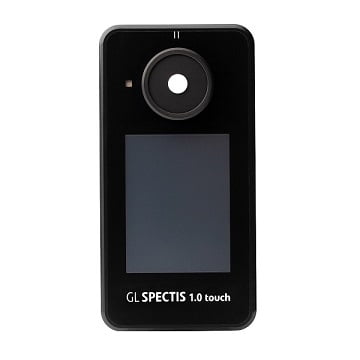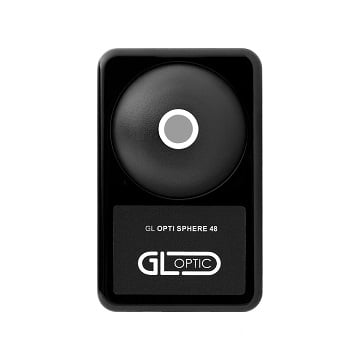GL SPECTROLUX
Robust design. Exceptional performance. Budget-friendly.

Handheld spectral light meter
LED and other lighting technologies require fast, accurate measurements that many light meters simply can’t achieve. As a leader in professional light measurement test devices, we designed the GL SPECTROLUX as easy-to-use, affordable spectrometer for every lighting professional.
Based on our popular GL SPECTIS 1.0 Touch, this simplified model is ideal for immediate measurement of illumination level & homogeneity, Color Temperature and coordinates, Spectral Power Distribution, LED color rendering, PAR/PPFD and more. Each device is individually calibrated and traceable to international reference standards and equipped with a laboratory grade measurement head for superior accuracy and repeatability that sets new price and performance standards for the industry.
Easy lighting audits
Use this spectral device for on-site measurement of the existing or new lighting installations and prove the compliance of the installation with designs’ specific requirements.
Quality lighting products
Get control of your lighting products and components quality. Use this device to check components like LEDs, drivers or lenses when you buy. Why not using this device as a sales tool to show the advantages of your products when you present them to clients or end-users?
Simple evaluation and adjustment
If you are setting stage lighting for an accurate CCT/CRI of museum and studio lights to proper lux levels, this device makes it easy to analyze and adjust lighting parameters. There is a useful uniformity testing option available on board the handheld meter for convenience.
GL SPECTROLUX Usage
This handheld affordable spectrometer can be used to evaluate lighting installations, quick control of LED lamps and luminaires or even to support application and sales engineers to quantitatively highlight the advantages of modern lighting systems to customers. Finally, it can also be used for competitive insights by evaluating competitors’ products and installations.
Results at the touch of a button
Modern electronics and efficient design yield highly accurate results in seconds… every time. All important metrics are displayed instantly on the LED display, allowing you to make better assessments, faster.
Affordable spectrometer - low price, high performance
Even though this is GL’s most budget instrument, it has industry best DIN Class B cosine corrected measurement head as a standard accessory allowing for optimal measurement of light from the 180° measurement condition, according to Lambert’s Cosine Law.
Built to last
Despite its attractive price, GL SPECTROLUX illuminance light meter does not sacrifice quality of materials. Designed and manufactured in Europe, these solidly constructed devices are in a class of their own and ready for the rigors of field audits.
GL SPECTROLUX Features
Reliable, precise and intuitively operated spectral instrument
GL SPECTROLUX spectral light meter delivers reliable and accurate optical performance with a budget friendly price. Dependable light measurement is no longer restricted to only experts or external laboratories. Our preconfigured, individually calibrated light measurement instruments deliver fast and precise results.
Class leading features:
- Self contained handheld spectrometer
- Dark current compensation
- DIN Class B measurement head
- Photometric and radiometric calibration
Powerful reporting and analysis capability
The included GL SPECTROSOFT Connect software enables basic analysis and reporting capabilities that deliver the results that matter. Take your analysis to new heights by upgrading to our industry leading GL SPECTROSOFT software. This flexible, easy-to-use tool offers completely custom reporting options, extended analysis capabilities, and unique tools like Lighting Audit Automation and Spectrum mixer.
GL SPECTROLUX Metrics
The GL SPECTROLUX allows you to measure:
- LUX – Illumination level lux [lx]
- foot candles [fc]
- SPD – Spectral Power Distribution from 380 -780 nm
- CRI – Color rendering index according to CIE – and IES TM30
- CCT – Correlated Color Temperature [K]
- COLOR – Color coordinates according to CIE 1931
- PAR/ PPFD – Calculations of photon flux density and photosynthetically active radiation [µmol]
GL SPECTROLUX Specifications
APPLICATION |
|
| Natural light, LEDs, halogen light, etc. | |
LED MEASUREMENT |
|
| Illuminance [lx]* | 10 – 100 000 lx (for white LED) |
| Irradiance [W/m2] | 0.03 – 600 W/m² (for white LED) |
| Illuminance class | Class B – DIN 5032-7 |
| Tolerance – cosine response (f2‘) | < 3% |
| Luminous intensity [cd] | Calculated in SPECTROSOFT |
| Spectral range | 340 – 780 nm (UVa – VIS) |
CALCULATED VALUES |
|
| CRI – Color rendering index according to CIE | Ra, R1 – R15 |
| CCT – Correlated color temperature according to CIE 13.3 | ✓ |
| Color peak | ✓ |
| Color dominant | optional with GL SPECTROSOFT |
| Color position coordinates [x,y] according to CIE 1931 | ✓ |
| Color position coordinates [u‘,v‘] according to CIE 1976 | ✓ |
| Color position coordinates [u, v] according to CIE 1960 | ✓ |
| PAR/PPFD | ✓ |
| Color coordinate error | optional with GL SPECTROSOFT |
| Metameric index | optional with GL SPECTROSOFT |
| Binning | optional with GL SPECTROSOFT |
| Assessment in accordance with ISO 3664 | optional with GL SPECTROSOFT |
PHOTOMETRY / RADIOMETRY |
|
| Sensor type | Back thinned CCD |
| Number of pixels | 256 |
| Physical resolution / datapoint interval | ~ 1.7 nm |
| Wavelength reproducibility | 0.5 nm |
| Integration time | 5 ms – 10 s |
| A/D converter | 16 bit |
| Signal-to-noise ratio | 1000:1 |
| Stray light | 2*10 E-3 |
| Optical resolution / FWHM | 10nm |
| Radiometric accuracy** | 5% within range 340 – 500 nm |
| 4% within range 500 – 780 nm | |
| Flicker compensation | ✓ |
| Temperature sensor and dark current compensation | ✓ |
| Uncertainty of color coordinates** | 0.0015 |
GENERAL PROPERTIES |
|
| Operating System | Linux |
| Power supply via USB connector | < 640 mA |
| Power adapter | Power supply unit 100…240 V (50/60 Hz) 0.15 A |
| Battery / Power pack | Li-ion battery 1350 mAh |
| Automatic shut-off | ✓ |
| Battery life | < 6 h |
| Operating temperature | 5 – 35°C |
| Dimensions [H x W x D] | 155 mm x 72 mm x 25.3 mm (with standard diffusor) |
| Weight | 221 g |
| Tripod adapter | ✓ |
INTERFACE & MEMORY |
|
| USB | USB 2.0 |
| Measurement result storage | Auto / Internal memory |
| Data format | XML |
DISPLAY & OPERATION |
|
| Display | 2.8“ color LCD (240 x 320 px) |
| Operation | Membrane buttons, PC / Notebook |
SOFTWARE |
|
| Software | Optional GL SPECTROSOFT Basic / Pro / Lab |
| USB cable | ✓ |
ORDERING INFORMATION |
|
| Battery | ✓ |
| USB cable | ✓ |
| Power supply | ✓ |
| Display protection foil | ✓ |
* Dynamic range is spectrum related and should be calculated separately for any light source. Estimated dynamic range for typical 4000 K white LED. Range estimated for optical system made to default specification. Alterations of that are often possible. Please consult technical support if you are looking for specific parameters.
** Absolute measurement uncertainty immediately after calibration. The expanded uncertainty corresponds to a coverage probability of 95% and the coverage factor k = 2.
Parameters valid in laboratory conditions 25°C, relative humidity 45%.
Note: Instrument, firmware and software specification are subject to change without prior notice. All information included in GL OPTIC datasheets and product information available in any form are carefully prepared and included information believed to be true. Please note that discrepancies may occur due to text and/or other errors or changes in the available technology. We advise to contact GL Optic before the use of the product to obtain the latest product specification.
Below you will find materials ready for download. Click on the file that interests you to download it.
Video
Related products
GL SPECTROSOFT M
GL SPECTROSOFT M is an analytical PC-based software designed for laboratory applications, field work, production quality control and for general light assessment purposes.
GL SPECTIS 1.0 TOUCH
High performance and user friendly smart spectrometer. Class leading accuracy and unmatched flexibility with a wide range of accessories.
GL OPTI SPHERE 48
Measure radiant power, luminous flux, color temperature, color coordinates and color rendering index (CRI) of LEDs.


